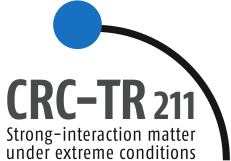
EMMI Workshop and International Workshop L on Gross Properties of Nuclei and Nuclear Excitations: "Strong interaction physics of heavy flavors"
Scope of the meeting
The workshop addresses the following main topics and goals:
- Exotic hadrons with heavy flavors
In this track we will discuss the spectrum of heavy-hadrons with an emphasis on exotic states such as tetraquarks/ meson molecules, pentaquarks, hybrids, and glueballs. We will address the following key questions:
- What do we know about the structure of exotic hadrons with heavy quarks?
- What are current experimental highlights and which future measurements can be expected?
- What is the status of theoretical determinations of the QCD spectrum with heavy quarks?
- Which future observables will lead to insights regarding the structure of exotic QCD states?
- Finite Volume methods
Finite-volume methods provide an avenue to understand scattering amplitudes and resonances. Due to improved computer resources, novel methodologies, and algorithmic developments, studies of excited- and multi-hadron states in lattice QCD are now standard. In parallel, finite-volume methods have been applied to understand multi-particle resonances and dripline nuclei. In this context, we will focus on the following key questions:
- What is the status of the three-body quantization condition and its application in the analysis of lattice data? How can theoretical uncertainties in the extracted observables be minimized?
- What are practical applications of extensions to decay processes and what needs to be done on the simulation side?
- How important are the contributions from long-range pion exchange and how can they be addressed?
- Open heavy flavor hadron spectra and yields
This part of the meeting will discuss how a quark-gluon or hadronic medium affects the yields and momentum spectrum of hadrons containing heavy quarks. Key questions to address include:
- What are heavy-ion experiments teaching us about the heavy-flavor interactions with the quark-gluon plasma?
- What have we learned and where should we focus our future effort?
- Quarkonium suppression and enhancement
The yield of doubly-heavy states, especially $J/\psi$, are lower in heavy-ion collisions than the scaled proton-proton rate, except at the highest collision energies, where these states are actually enhanced. In discussing how this occurs, we will address the following key questions:
- What is the latest experimental situation, and what progress can we expect in the next round of experiments?
- Which role does thermodynamics play in the formation of heavy-flavor hadrons and, in particular, quarkonium states?
- What nonequilibrium processes are at work and how can we best predict suppression/enhancement?
Workshop format
The program will consist of invited talks and selected contributions. Sessions will take place from 9:00am to 12:00am and from 4:45pm to 7:00pm.
The workshop takes place at the Darmstädter Haus.
Supported by:


